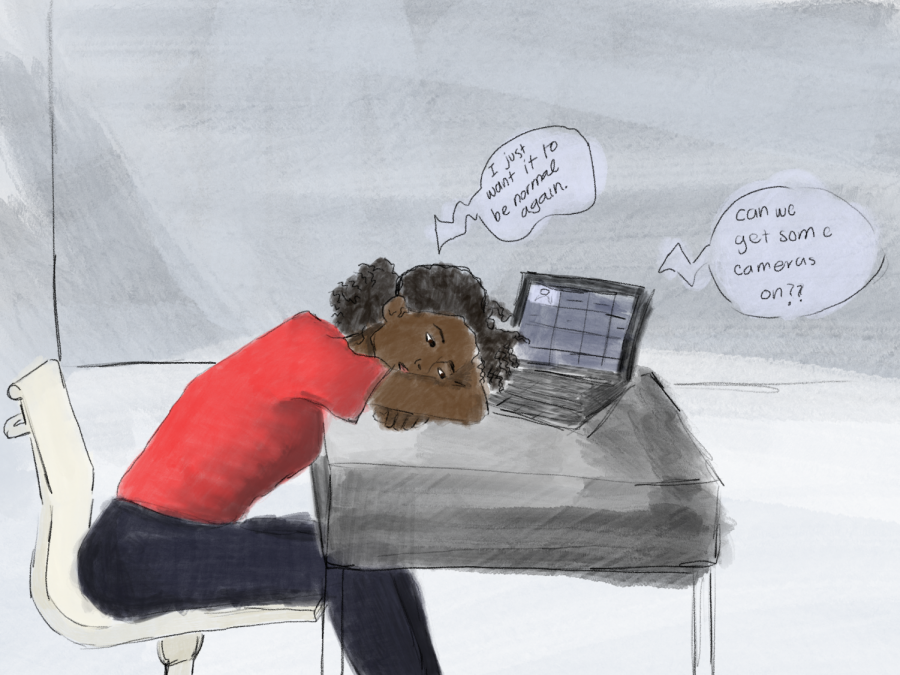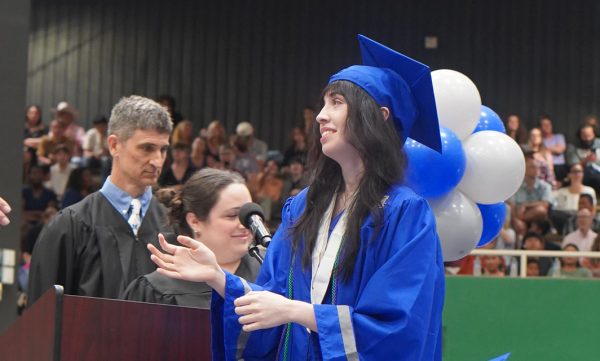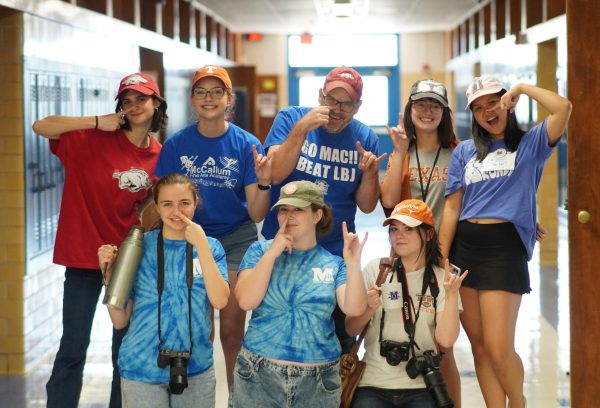Weathering the storm
Struggling with mental health? Students, staff, social worker promise you are not alone.
For many people, the isolation has been the hardest part of the pandemic experience. English teacher Amy Smith says she has never had as many students struggling academically and emotionally as she has this year.
May 16, 2021
Over the past year, life has shifted completely, turning our sense of normal upside down. With all this change, it’s been harder and harder for people to obtain a sense of normalcy. When every day holds a new, life-changing occurrence, it’s hard to feel stable, especially when we have to continue to try to progress and learn and be productive throughout it all, going to virtual school and having birthdays and other milestones under the shadow of the pandemic. Because of this, many people feel their mental health has declined, and people are struggling to maintain a healthy outlook.
“I personally struggle with general anxiety and depression, so being locked down in my house for the past few months has been nothing short of a challenge for my mental health,” senior Ari Miller-Fortman said. “It gets pretty isolating being at home practically by myself at most times, and being able to motivate and encourage myself to complete my responsibilities has never been harder.”
Although her mental health has suffered, she does feel that it’s been easier to get her work done since she finds more opportunity to manage her schedule full of assignments and orchestra rehearsals.
“I don’t have to drive back and forth to and from school, rehearsals have been minimized to once a week, and I can manage my time from home a lot easier,” Miller-Fortman said. “It’s a lot better for me to be able to rest as much as possible and do school work when necessary.”
Sophomore Camille Wilson also feels the effects of isolation.
“I think my mental health has definitely declined and continues to decline the longer quarantine lasts,” Wilson said. “Without seeing friends and without fully understanding or comprehending the situation we are all in, I have been constantly stressed and not myself.”
For Wilson, school has gotten more difficult as she struggles to complete her workload on time.
Without seeing friends and without fully understanding or comprehending the situation we are all in, I have been constantly stressed and not myself.
— sophomore Camille Wilson
“I’m losing motivation to do even the simplest assignments,” Wilson said. “The thought of waking up each day to simply sit in front of a screen for hours is so depressing. I barely even have time for my family, since all night I stay up trying to complete the work that I had procrastinated from the night before.”
She feels her focus in class has been destroyed this year.
“I am usually on top of all my work, but this year is so different,” Wilson said. “I can barely remember anything that we learn on Zoom, and basically have to teach everything to myself after class.”
Although she’s struggling in school, she sympathizes with her teachers who are also trying to make things work in this less-than-ideal situation.
“The entire situation is so complex, and we cannot blame the teachers at all,” Wilson said. “They have to teach us, and they can’t necessarily slow down, since we have to learn as much as we would be learning in person.”
English teacher Amy Smith says she has never had as many students struggling academically and emotionally as she has this year. She makes a point to focus on social and emotional learning in class every day with a check-in to see how students are doing.
“They can tell me anything – good things that are happening, or they can expand on their struggles,” Smith said. “Many students have been very honest here and reached out because they are hurting and struggling.”
She also uses welcoming activities at the beginning of class to build community and give students a break from the school day.
When people are so stressed or anxious or depressed that they can’t focus on learning, then it doesn’t matter how strong our lessons are. … While it’s not our responsibility to teach the soul or heart, we do know that the mind doesn’t work well when the soul or heart isn’t fed.
— literature teacher Amy Smith
“[On Monday and Tuesday] we are often in breakout groups either answering fun questions or solving puzzles together or participating in a Zoom scavenger hunt or playing a game like ‘What’s on your phone?’’’ Smith said. “[On Wednesday and Thursday] we have about 10 minutes of mindfulness practice and we learn about different strategies. On Fridays I usually create a fun game for the whole class for our warm-up.”
Wilson appreciates similar check-ins her own teachers do in class.
“Mr. Hutcheson, my English teacher, does mindfulness every class,” Wilson said. “I am always so relieved to start class off with that, and I feel like he has also been doing a really good job of teaching reasonably for COVID. Actually, all of my teachers have been doing some sort of check-in each day, whether that being ranking how you feel out of five or just talking about your day or weekend. I think that’s really helpful for seeing that everyone is going through the same thing.”
Smith believes it’s incredibly important to focus on mental health in school in order for students to thrive.
“When people are so stressed or anxious or depressed that they can’t focus on learning, then it doesn’t matter how strong our lessons are,” Smith said. “Plus, the mind is only one part of the body. There is the soul and the heart. While it’s not our responsibility to teach the soul or heart, we do know that the mind doesn’t work well when the soul or heart isn’t fed.”
She says it has been the hardest teaching year she’s ever experienced, from the isolation, to the workload, to worry for her students.
“I love the energy of a classroom – I love being around the students – I love the relationships,” Smith said. “And I have missed this, so it has made me depressed. I know it is only temporary, but it feels like it has been forever. The work is twice as hard – getting everything online. And the payoff isn’t nearly as strong because I don’t get to have fun with the kids. So it really feels like hard, hard work.”
Katie Malinski is a social worker in Austin who specializes in family therapy. She says it makes sense that so many people are struggling with their mental health right now.
“Humans are social creatures,” Malinski said. “We’re hardwired for connection. And the pandemic has forced us to isolate from a lot of social connections, and that’s really hard on us.”
Even just talking with your friend in the front yard from 10 feet away can actually be a huge sort of reset button because it’s your friend, somebody outside of your family, not just the teacher through a screen.
— social worker Katie Malinski
For many people, the isolation has been the hardest part of the pandemic experience. Wilson is doing her best to stay connected with her friends despite being unable to hang out with them like usual.
“I totally understand why [we have to quarantine], but it’s hard,” Wilson said. “It was definitely a struggle at the beginning, and all of my friends kind of drifted as a result, but we text and FaceTime a lot to stay in touch. When there’s a good opportunity, we do a distanced hang out.”
Malinski advises young people to do everything they can to stay in contact with their friends. Whether that’s virtual or in person from a distance, she urges students to find something that works for them.
“It’s so hard,” Malinski said. “Think creatively and talk with your parents about safe ways to have some kind of social connection. Even just talking with your friend in the front yard from 10 feet away can actually be a huge sort of reset button because it’s your friend, somebody outside of your family, not just the teacher through a screen.”
For Smith, the hardest part has been the separation from her family.
“My father-in-law died this past spring, and we couldn’t even be with him when he was dying in the hospital,” Smith said. “My mother-in-law is in a nursing home and until recently we could only visit through a window. Now we can at least see her face to face for a few hours every once in a while.”
Smith has her own strategies she’s been using for years to help with stress.
“I practice centering prayer,” Smith said. “It is a form of meditation and prayer and mindfulness. I also keep a gratitude journal, which helps me stay focused. Both of these practices have been part of my routine for years.”
Something extremely important I learned [from] this quarantine is to always put yourself first. You can be selfless without sacrificing your mental health and happiness.
— senior Ari Miller-Fortman
Wilson’s understanding of her own mental health has changed because of the pandemic.
“I did struggle with my mental health before COVID, but being so isolated, and having so much time to dwell on my life and myself, more struggles or realizations have definitely come to surface,” Wilson said. “I think it has benefitted me slightly, being able to fully understand how my mental health shows itself under new situations, but it has also been slightly scary. I have learned what affects me for the better and for the worse because of having so much time alone, but most notably, I have learned what helps me!”
Wilson recommends finding something to look forward to when you’re feeling overwhelmed.
“Whenever I feel stressed or worn out, I get out my watercolors and my music, and I just paint for as long as I need to,” Wilson said. “Finding something to take your mind off of life is so important. I think having time to focus on yourself is so important to anyone, even though with the pandemic it came with a million other things to worry about.”
Malinski agrees, and suggests taking a break is one of the best ways to help lift your spirits.
“Get up and move your body so that you’re not staring at the screen in Zoom all day, every day, because it’s actually really hard on us,” Malinski said. “Advocate for yourself to be able to turn the screen off from time to time because that helps you to self regulate better. And make sure you’re getting enough sleep!”
She urges people not to be too harsh on themselves.
“This is one of the hardest years that any of us have ever been through, so try to be gentle and generous with yourself and others,” Malinski said.
Miller-Fortman also offers advice to think of your own needs.
“Something extremely important I learned [from] this quarantine is to always put yourself first,” Miller-Fortman said. “You can be selfless without sacrificing your mental health and happiness.”










![This is Paul Pews high school graduation photo. The 2023-2024 school year marked his 34th year of teaching. He began his career in Washington, then came to McCallum where he has taught for the past 17. At heart though, he’s really a musician. One that grew up in many different places, including Chicago and California, who took interest in teaching from a young age. His high school choir experience, along with some international singing in college, persuaded him that teaching was his path. He knew he wanted to be able to help create works of art in the fine arts department as well, so he joined McCallum. He’s worked on many of the musicals over the years, even before Joshua Denning, the former theatre director of the fine arts program arrived. Before him was a different director: Tatum.
“I was the music director for all the musicals,” Pew said. “[Mr. Tatum and I] worked very hard, and I just got to the point where I was satisfied with it.” Although he may not be as prominent of a member in the musical theatre community at McCallum anymore, he still plays piano. “I still do a lot of music down at the Music end of the building,” Pew said. Photo courtesy of Paul Pew.](https://macshieldonline.com/wp-content/uploads/2024/07/Paul-Pew-1974-444x600.jpg)

![DANCING QUEEN ONLY 15: The Mccallum quinceañera took place Saturday May 18 in the cafeteria. Students who danced at the quinceañera practiced for weeks during lunch and after school with the help of Señora A to perfect this special moment. “I signed up for fun and for the dress originally, but I actually made a lot of friends, and it helped me want to come back to practice,” said Elizabeth Peables, a freshman quinceñeara. “It’s been stressful, but it always works. We stayed very late yesterday [the day before the event], but today it feels like everything came together.”
Caption by Nellie Eschberger with reporting by Beatrix Lozach.
LA REINA DE BAILE, SOLAMENTE TIENE 15 AÑOS DE EDAD: La Quinceñera de McCallum fue el 18 de Mayo en la cafetería. Estudiantes que bailaron en la quinceañera practicaron por semanas durante el almuerzo y después de la escuela con la ayuda de la Sra. A para perfeccionar este momento especial.
“Originalmente me inscribí para divertirme, y por el vestido, pero actualmente hice muchos amigos y me ayudó a querer regresar a la práctica.” Dijo la estudiante de primer año Elizabeth Peables. “Ha sido muy estresante, pero siempre funciona.” “Nos quedamos muy tarde ayer el día antes del evento pero hoy se siente que todo está cayendo en forma.”
Leyenda por Nellie Eschberger con reportaje de Beatrix Lozach. Traducción por Maverick Palacios.](https://macshieldonline.com/wp-content/uploads/2024/06/53732328578_3ee2526f55_o_53769409497_o-600x338.jpg)



